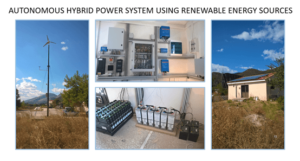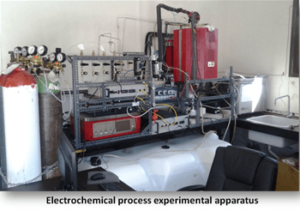LABORATORY MEMBERS
Personnel:
Costas A. Elmasides (Assistant Professor, Chemical Engineer, assigned in August 2014) and Costas J. Athanasiou (Assistant Professor, Chemical Engineer, assigned in June 2010) are the two Faculty members of the Laboratory, the first focusing his interests in Renewable Energy Power Supply Systems and energy storage systems and the second in Fuel Cells and Biomass. As members of the N-CES lab they have elaborated a number of publications in peer reviewed journals, international conferences and book chapters.
LABORATORY DETAILS
Address:
Department of Environmental Engineering, Democritus University of Thrace, Vas. Sofias 12, 67100 Xanthi, GREECE
Contact:
Dr C. Elmasides
Tel.: +30 2541079876 (+30 6974447972)
Email: kelmasid@env.duth.gr
Dr C. Athanasiou
Tel.: +30 2541079316 (+30 6937657128)
Email: kathan@env.duth.gr
SCIENTIFIC AIMS
Laboratory of Energy Production Technology from Non-Conventional Sources is located at the premises of the Environmental Engineering Department, and initiated its operation in June 2010. Its scientific aims lie in the fields of:
– Solid Oxide Fuel Cells (SOFCs) and the utilization of renewable fuels in SOFCs
– Energy management of Hybrid Power Supply Systems comprising of photovoltaic, wind generators and energy storage systems
– Biomass potential estimations
– Techno-economic feasibility studies regarding biomass-to-energy applications
COLLABORATIONS
The laboratory closely collaborates with:
– the Laboratory of Process Systems Design and Implementation of the Chemical Process Engineering and Energy Resources Institute
– the Laboratory of Electrochemical Processes of Chemical Engineering Department of the Aristotle University of Thessaloniki, and
– the Laboratory of Alternative and Renewable Fuels of the Mechanical Engineering Department of the University of Western Macedonia
– Systems Sunlight SA (http://www.systems-sunlight.com/el/ )
and in the context of national and international research projects, it has also collaborated with numerous other institutions, universities and companies (University of Castilla-La-Mancha, University of Amsterdam, Hellenic Petroleum Renewable Energy Sources S.A., Tecnologias Avanzadas Inspiralia SL, St Andrews University, RISO DTU, AIRBUS and others).
INFRASTRUCTURE
The N-CES lab mainly consists of the following fully equipped experimental units.
A. Three experimental and fully recordable Hybrid Power Supply System comprised of:
1st System
Photovoltaic array with installed power of 705Wp
An Energy storage system consisted of a strings of lead/acid cells of similar capacity, contributing to an overall accumulator of 200 Ah nominal capacity and 12 Volt nominal voltage.
DC/DC converter/charger that connects the PV array with the DC bus
DC/AC inverter/charger of nominal power 1200Watt that connects the dc bus to the loads
2nd System
Photovoltaic array with installed power of 470Wp
An Energy storage system consisted of a strings of lead/acid cells of similar capacity, contributing to an overall accumulator of 56 Ah nominal capacity and 24 Volt nominal voltage.
DC/DC converter/charger that connects the PV array with the DC bus
DC/AC inverter of nominal power 350Watt that connects the dc bus to the loads
3rd System
Photovoltaic array with installed power of 1590Wp
Wind generator rated at 1000Wp
An Energy storage system consisted of a strings of lead/acid cells of similar capacity, contributing to an overall accumulator of 150 Ah nominal capacity and 48 Volt nominal voltage.
DC/DC converter/charger that connects the PV array with the DC bus
DC/AC inverter/charger of nominal power 3000Watt that connects the dc bus to the loads.

B. An experimental apparatus for fuel cell and electrochemical measurements. It consists of:
• a high temperature (1500 oC) furnace for the preparation of unit SOFCs and the SOFCs operation at high temperature
• a system for the preparation and measurement of reactants/products gaseous stream
• a galvanostat-potentiostat for the electro-chemical measurements, and
• an analysis system for the gaseous streams including a gas-chromatograph and a continuous CO/CO2 infrared analyzer.

RESEARCH PROJECTS
Since 2010, the Laboratory has participated in the following research projects:
Completed
• “CO2 and H2O toward methanol synthesis at atmospheric pressure in co-ionic electrochemical membrane reactors” CAPITA COMMON INITIATIVE
• “A novel technology for producing bio-based synthetic textile fibres from biomass-derived furanic monomers” – 298619 – FP7-SME-2012-2, EU
• “Efficient Conversion of Coal to Electricity – Direct Coal Fuel Cells (DCFC)” – Research Fund for Coal and Steel, EU
• “Novel anodes for solid electrolyte membrane reactors and their applications in solid oxide fuel cells” – Contract with King Abulaziz City for Science and Technology
• “Study of the Biomass Potential for 2nd Generation Biofuels in Greece” • “High Specific Energy Lithium Cells for Space Exploration”, funded by European Space Agency (ESA) (2014 – 2015).
In Progress
• “Future Lithium-ion technology: Development of advanced materials & Lithium-ion cells of space batteries”, funded by European Space Agency (ESA) (2017 – 2019).
• “TOWARDS ZERO ENERGY HOSPITALS IN THE BALKAN REGION – ZenH Balkan” Interreg Balkan-Mediterranean Programme 2014 -2020.
• “Innovative High Energy Density Li-ion batteries operating at low temperature /HELT-Bat” funded by European Space Agency (ESA) (2018 – 2020).

